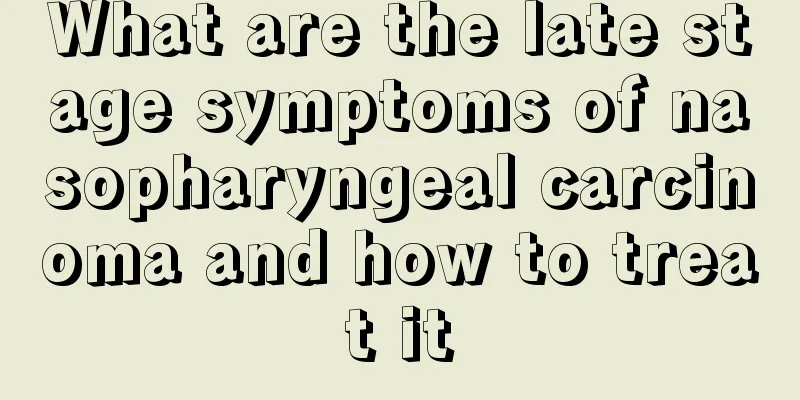What are the late stage symptoms of nasopharyngeal carcinoma and how to treat it

|
What are the late symptoms of nasopharyngeal carcinoma? How to treat it? Due to the hidden anatomical location of the nasopharynx, the early symptoms of nasopharyngeal carcinoma are atypical, early diagnosis is difficult and easy to delay, so special vigilance should be taken. Most cases are discovered in the middle and late stages, and the best treatment opportunity is lost. In advanced nasopharyngeal carcinoma, the symptoms of cancer penetration and metastasis are obvious. The specific symptoms are as follows: 1. Nasal congestion: When the tumor invades the nostrils and nasal cavity, nasal congestion symptoms are obvious. 2. Eye symptoms: When nasopharyngeal carcinoma invades the nerves related to the eye socket and the eyeball, visual impairment, exophthalmos, diplopia, and restricted eye movement may occur. 3. Ptosis and fixed eyeballs: related to oculomotor nerve damage. Vision loss or disappearance is related to optic nerve damage or orbital cone invasion. Hoarseness and dysphagia are related to vagus nerve and glossopharyngeal nerve damage. 4. Diplopia: Due to tumor invasion of the abducens nerve, outward vision often results in double vision. Sliding nerve invasion often results in inward strabismus and diplopia. It often damages the trigeminal nerve at the same time. 5. Tinnitus and hearing loss: Tumor infiltration and Eustachian tube compression cause negative pressure in the tympanic cavity. 6. Headache: It usually manifests as persistent unilateral pain, mostly on the top of the face, which is also one of the symptoms. 7. Tongue muscle atrophy and tongue deviation: Nasopharyngeal carcinoma directly invades or lymph nodes metastasize to the posterior part of the styloid process or the hypoglossal canal, invading the hypoglossal nerve, causing the tongue to deviate to the affected side, accompanied by tongue muscle atrophy on the affected side. How to treat nasopharyngeal carcinoma? Most of the late stages are stage III or stage III IV. That is, the tumor has invaded the nasal cavity, oropharynx or brain, cranial nerves and distant metastasis. The development of the specific situation also varies from person to person, so patients must go to the hospital for detailed examination in order to develop a better treatment plan. Patients with advanced nasopharyngeal cancer have extremely weak constitutions and low immunity. In the clinical treatment of patients with advanced nasopharyngeal carcinoma, cellular immunotherapy is used to enhance the effects of surgery and radiotherapy, improve immunity, and prevent cancer cell metastasis and recurrence. |
<<: Can early cervical cancer be cured?
>>: Can I eat peanuts after breast cancer surgery
Recommend
Is back pain caused by uremia?
Uremia is a comprehensive disease. It does not si...
What to do if the gums are separated from the teeth
Gums are a very important part of the tooth struc...
What are the best melanoma hospitals
What are the best melanoma hospitals? In daily li...
How to diagnose early rheumatoid arthritis?
Rheumatic disease is a type of joint disease that...
What are the methods of stewing radish and pork ribs soup
In this spring season, we should eat more nutriti...
Scrotal redness, swelling and stinging
The male scrotum is like the female vulva, which ...
When is the best time to drink water?
Water is an indispensable part of our lives and i...
The efficacy and function of white agate
Agate is a type of gemstone. Agate has very color...
Thiofuramide precautions
People who don’t do farm work may not be familiar...
What is the best way to deal with blackheads after squeezing them
Generally, after squeezing out blackheads, you ne...
How to check liver cancer with ultrasound? Detailed explanation of the characteristics of liver cancer with ultrasound
What is the role of ultrasound examination for li...
Can I eat nuts while losing weight?
Nuts can be said to be a relatively special snack...
What should you pay attention to in your life to prevent liver cancer? Doing this every day can easily lead to liver cancer
Excessive alcohol intake is harmful to health. A ...
Parasites in pork
Parasites in pork will not only directly affect t...
What's the matter with the small fleshy lump in the belly button
If you observe carefully, you will find that ther...









